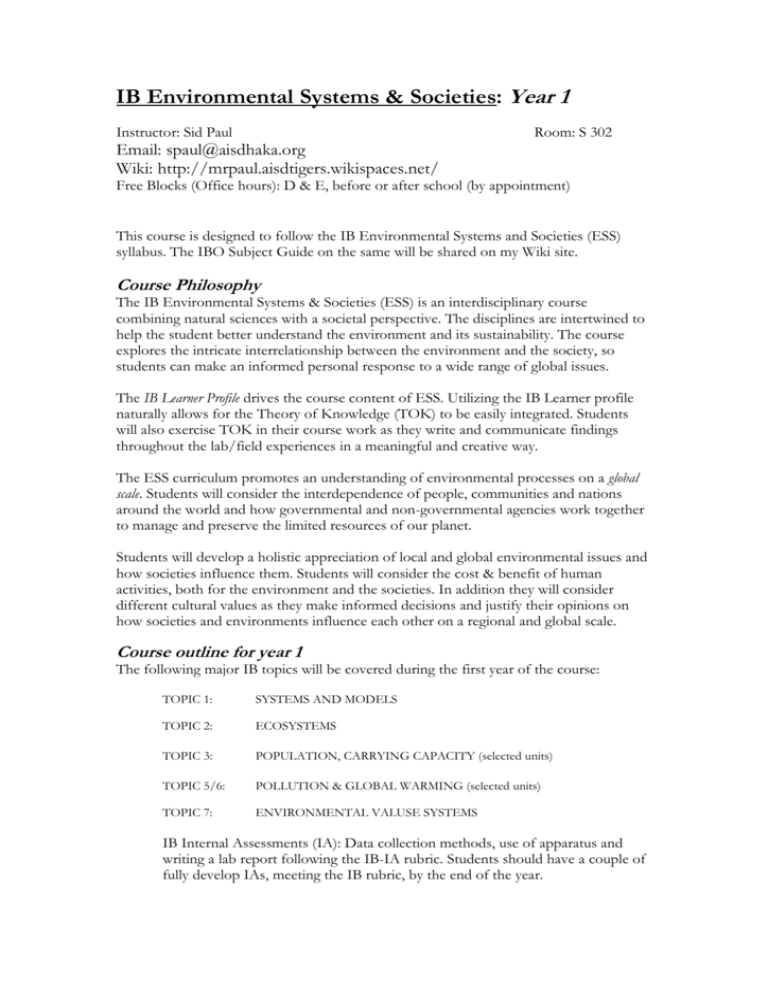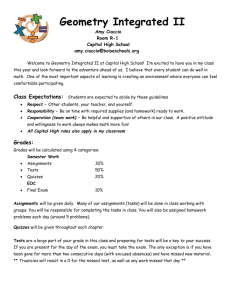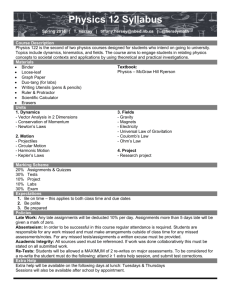
IB Environmental Systems & Societies: Year 1
Instructor: Sid Paul
Email: spaul@aisdhaka.org
Wiki: http://mrpaul.aisdtigers.wikispaces.net/
Room: S 302
Free Blocks (Office hours): D & E, before or after school (by appointment)
This course is designed to follow the IB Environmental Systems and Societies (ESS)
syllabus. The IBO Subject Guide on the same will be shared on my Wiki site.
Course Philosophy
The IB Environmental Systems & Societies (ESS) is an interdisciplinary course
combining natural sciences with a societal perspective. The disciplines are intertwined to
help the student better understand the environment and its sustainability. The course
explores the intricate interrelationship between the environment and the society, so
students can make an informed personal response to a wide range of global issues.
The IB Learner Profile drives the course content of ESS. Utilizing the IB Learner profile
naturally allows for the Theory of Knowledge (TOK) to be easily integrated. Students
will also exercise TOK in their course work as they write and communicate findings
throughout the lab/field experiences in a meaningful and creative way.
The ESS curriculum promotes an understanding of environmental processes on a global
scale. Students will consider the interdependence of people, communities and nations
around the world and how governmental and non-governmental agencies work together
to manage and preserve the limited resources of our planet.
Students will develop a holistic appreciation of local and global environmental issues and
how societies influence them. Students will consider the cost & benefit of human
activities, both for the environment and the societies. In addition they will consider
different cultural values as they make informed decisions and justify their opinions on
how societies and environments influence each other on a regional and global scale.
Course outline for year 1
The following major IB topics will be covered during the first year of the course:
TOPIC 1:
SYSTEMS AND MODELS
TOPIC 2:
ECOSYSTEMS
TOPIC 3:
POPULATION, CARRYING CAPACITY (selected units)
TOPIC 5/6:
POLLUTION & GLOBAL WARMING (selected units)
TOPIC 7:
ENVIRONMENTAL VALUSE SYSTEMS
IB Internal Assessments (IA): Data collection methods, use of apparatus and
writing a lab report following the IB-IA rubric. Students should have a couple of
fully develop IAs, meeting the IB rubric, by the end of the year.
Assessments Of Quarter and Semester Grades
Quarter Grades will be calculated using the following percentages below:
Tests & Quizzes:
Labs work/activity reports:
Homework:
65%
20%
15%
Semester Grade = 80% from 1st and the 2nd Quarter Grade + 20% Final Exam.
Homework
Homework should be compiled in the binder. The binder can also be used for class work
and filing worksheets given in class. We will provide lined sheets, and a divider, in class
to help separate the two sections in the binder.
Some Electronic homework assignments/submissions will also be made available from
time to time. A Google Doc account is required to save/share their work at one place,
both for continuity and quick review.
Major assignments and lab reports should be submitted electronically. This would allow
for timely monitoring and evaluation of daily assignments as well as help us create a
greener environment.
Late work Policy
Homework assignments must be completed at the beginning of each class period in
which they are due. Most homework is considered ‘formative’ in assessing student
progress and thus will receive a completion (collected) or Incomplete/Missing grade,
with an opportunity to make up the missed work. There are also some structured
homework and lab reports that are evaluated for a numerical grade. Although their ontime completion is critical for student learning, a late grade will be awarded on them whenever applicable.
Late lab work and other assignments that are collected for evaluation will be marked
down 10% per late “school day”.
Make-Up Work
It is your responsibility to see me about make up work your first day back from an
absence. In general, you will have the same number of days to make up work as days you
were absent. Tests/quizzes can be made up during free periods, or before and after
school, not during your class time.
Required Textbook/Workbooks
1. (a) Environmental Systems & Societies, Pearson Baccalaureate (paperback).
(b) Biozone Workbook on Environmental Science (paperback).
2. Reference text: Environmental Science: towards a sustainable future,
9thedition, Richard T. Wright, Pearson/Prentice Hall (provided).
You need to bring just one book (as announced in class/posted on the wiki) to class.
Internet Access
IB ESS students will need access to the Internet occasionally to complete assignments or
to research global issues. Also daily homework assignments will be posted on the AISD
wiki. It is important that students look up the wiki at least once before the next class.
Academic Honesty
High integrity and academic honesty is expected. Students should not do anything that
would bring their integrity into question. Collaboration and teamwork is allowed only on
certain homework assignments (announced) and in sharing of data for a lab work, but
individual work, distinctly original from their lab partners’ work is required in the lab
report.
Materials (required)
A 3-ring binder to organize class notes, handouts, IB portfolio questions &
answers, and homework assignments (separated by a divider).
Pencil, pens (black or blue), a pen drive to save and bring data files to class
Missed Classes
Upon return, it is your responsibility to make up missed
work and to get caught up. Here are some steps in order
to help you follow through with this responsibility.
You will have the same number of days to make
up work as days you were absent.
Get the notes from the day that you missed
either from a classmate. Do the assigned
homework as posted on the wiki.
Upon your return, see me after the lesson and
find out what you have missed (hw/ quiz/test)
while you were absent. Be prepared to turn in
those assignments.
If you still have questions about the material
that you missed, make an appointment to meet
with me to go over your specific questions.
Getting Extra Help
My office hours are blocks D & E. Students are also
encouraged to come in for help after school and during
lunch breaks and Tiger Time (whenever I am not in a class
or a meeting).
Your reference textbook also has an interactive web site
(and a CD ROM) that you could browse from time to time:
http://wps.prenhall.com/esm_wright_envisci_9/21/5494/1406592.c
w/index.html







